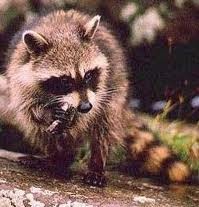I’ve been doing a bit of reading on some pond forums and have read stories of people’s ponds being targeted by mink over the winter months. As a matter of fact, one of my client’s ponds was totally cleared out over winter by a mink. They are small crafty little buggers in the weasel family. I just thought that I would let everyone know that it may be a good idea to check around your pond for tracks just to be sure that you don’t find your pond empty in spring.
When this happened to my client last year there pond was entirely cleared of life. They probably had 15-20 koi and goldfish in fall, but in spring, nothing. I was there doing the clean-out and I couldn’t believe my eyes. I found one fin at the base of the waterfall, that is it!!! No scales, no dead fish or frogs, no live frogs, nothin’. I will say that I have never seen a pond so void of life in the spring. Talk about awful, I felt terrible for the owners.
Evidently they had seen some tracks in the snow, but didn’t think too much of it. The mink must have gotten in through the hole in the ice where their winter pump was.
While I’m on the topic, let’s talk a bit more about predators. I’m sure that different areas of the country have different predators, but here in Wisconsin one of the most dreaded pond visitors is the Great Blue Heron. These birds are fishing machines! They are quite simply built to catch fish.
That’s not to say that they won’t also take their share of frogs, but I believe they prefer the fish. Not just any fish either, it seems that they usually catch the biggest prettiest one or the one that your kids just named.
Before I owned my pond, I assumed that these huge migratory birds just flew into the pond and started to feed. Well, I was wrong about that. I guess that flying in like that would scare the prey. I’ve seen these birds land on the other side of my yard, walk across the driveway and ever so slowly creep up to the edge of the pond. Very sneaky! They get themselves in place to strike without the fish even knowing that they are there. In our area, these birds have taken more unsuspecting pond fish than any other predator that I know of. They will even spear a fish that is too big to eat and just leave it to die on the shore. This was the fate of my beautiful powder blue butterfly Koi. So sad.
The only other predator that I have heard of eating our pretty little pond fish are the Raccoons. I personally have never seen one at my pond, but I know people who have seen them going after  their fish. I’ve only heard of them swatting at the fish from the pond edge, but I would guess that they might swim after them too. I have seen some fish with scars across their sides, presumably caused by a close call with a Raccoon. I guess that those would be the lucky ones.
their fish. I’ve only heard of them swatting at the fish from the pond edge, but I would guess that they might swim after them too. I have seen some fish with scars across their sides, presumably caused by a close call with a Raccoon. I guess that those would be the lucky ones.
As far as preventing these predators from getting to your fish, there are a few options, but none of them are very effective. I always install a fish cave into every pond to give the fish a place to hide, but this doesn’t help if they don’t know the Heron is there or if a Mink gets into the pond. A device called the scarecrow is a fairly effective deterrent for the Heron. This is a motion activated lawn sprinkler that will give the bird a spray if it detects motion. This will scare the Heron away, but these units are well known for spraying as many pond owners and pond maintenance guys as they are for spraying predators. Another option is pond netting, which will deter the Herons and possibly the Raccoon, but I doubt it would slow down a Mink. Trapping is always an option, but the Great Blue Heron is protected under the migratory bird act so you definitely don’t want to catch one of those. Also, depending where you live, you may have a never ending supply of racoon in your traps as these little guys are usually quite plentiful.
One of the best and possibly easiest deterrents may be the family pet. The more time your family dog spends pond-side, the less attractive your pond will look to any predator looking for an easy meal.
We’ll go into this more in the future. Until then, happy pondering and stay warm.
Doug Hurth



Be the first to leave a comment. Don’t be shy.